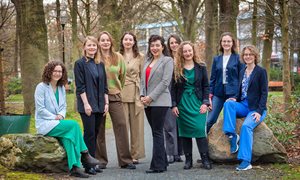
Dilemin Yildiz and Femke van Hout from Radboudumc have been awarded a Christine Mohrmann Stipend. They are among the group of ten female PhD candidates receiving this grant from Radboud University. The aim of the scholarship is to encourage the PhD candidates to continue their academic careers after completing their dissertations.
The scholarship, worth 6000 euros, enables PhD candidates to, for example, spend a period abroad at a university or to deepen their research in another way.
Since 1990, the Executive Board of Radboud University has annually awarded the Christine Mohrmann Stipends (until 2015: Frye Stipends) to promising female PhD candidates. The ten recipients for 2024 are: Maria den Hartog, Dilemin Yildiz, Dian Schrauwen, Tjits van Lent, Anna Oldeman, Gisela Otto, Femke van Hout, Judith van der Knaap, Tessa Ubels, and Lucy Spoliar.
Dilemin Yildiz – rare kidney disease research
Dilemin Yildiz researches rare kidney diseases in which the kidney filter is damaged. During her PhD project, Dilemin developed an organ-on-a-chip model. In this kidney filter model, two different types of kidney cells, which play a role in filtering the blood, can communicate with each other in a microenvironment. She investigates, among other things, which communication signals are disrupted and how these signals can be reactivated. The stipend makes it possible to learn an advanced technique from her collaboration partners in Boston (Harvard University) to further refine her kidney filter-on-a-chip. Ultimately, the model that Dilemin is developing can be used in the future to replace animal testing.
Femke van Hout – research on virus transmission by mosquitoes
Femke van Hout studies the mechanisms that define virus transmission by Aedes mosquitoes, notorious for spreading diseases like Zika and Dengue. She aims to understand why these mosquitoes are so good at transmitting viruses. Currently, Femke is advancing methods to characterize the mosquito’s response to viral infection, specifically at the level of gene expression. During her visit to collaborators at KTH Stockholm, Femke will use the stipend to expand these methods from cell culture models to actual mosquito tissues.
More information
Annemarie Eek

wetenschapsvoorlichter





